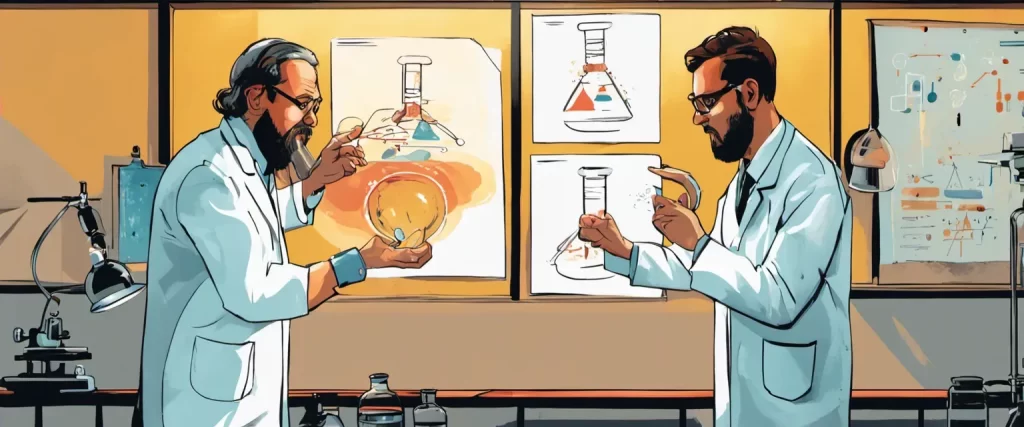Einstein: Unlocking the Cosmic Mind

Welcome to the captivating world of science, where extraordinary minds have shaped our understanding of the universe and challenged our perception of reality. Among these brilliant individuals stands Albert Einstein, a physicist whose name has become synonymous with genius. In his illuminating biography, “Einstein” by Walter Isaacson, we embark on a journey through the life and scientific achievements of this remarkable man. From his groundbreaking theory of relativity to his unyielding curiosity, Einstein’s legacy is woven into the very fabric of scientific discovery. Join us as we delve into the pages of this captivating book and explore the enigmatic mind that forever changed the landscape of modern science.
What is Science
Science is a systematic and logical approach to understanding the natural world through observation, experimentation, and the application of principles. It is a method of acquiring knowledge about the universe in a structured and organized manner, using a combination of empirical evidence, logical reasoning, and critical thinking.
At its core, science aims to explain the phenomena and processes that occur in the physical and natural world. It seeks to discover patterns, establish cause-and-effect relationships, and develop theories and laws that can be used to predict and understand the behavior of the natural world. Through the scientific method, scientists formulate hypotheses, design experiments, gather data, analyze results, and draw conclusions.
One of the key characteristics of scientific inquiry is its reliance on empirical evidence. Scientists base their theories and explanations on observations and measurements that can be repeatedly tested and verified by others. This ensures objectivity and allows for the replication and validation of results, which are essential for the advancement of knowledge.
Another essential aspect of science is falsifiability. Scientific theories must be formulated in such a way that they can be potentially proven wrong through experimentation and observation. This principle helps to ensure that scientific claims are testable and non-arbitrary, and encourages scientists to constantly question and revise their theories in light of new evidence.
The scope of science encompasses a wide range of disciplines, including physics, chemistry, biology, geology, astronomy, and many others. Each discipline employs its own specific methods and techniques, but all share a common commitment to rational inquiry and evidence-based reasoning.
Science has had a profound impact on human civilization, leading to advances in technology, medicine, and our understanding of the world. It has enabled us to harness the power of electricity, develop life-saving drugs, explore space, and uncover the fundamental laws that govern the universe.
In conclusion, science is a systematic and evidence-based approach to understanding the natural world. It relies on observation, experimentation, and logical reasoning to discover patterns, establish cause-and-effect relationships, and develop theories and laws. Through its rigorous methodology, science has transformed our understanding of the world and continues to push the boundaries of knowledge.
Why is Science Important to Us?
Science is important to us for several reasons:
1) Understanding the world: Science allows us to explore and understand the natural world around us. It helps us answer questions about how things work, why certain phenomena occur, and what the underlying principles and laws are that govern the universe.
2) Advancing technology: Science drives technological advancements that enhance our daily lives. From medical breakthroughs to communication and transportation improvements, science plays a crucial role in developing new and better technologies.
3) Solving problems: Science equips us with the knowledge and tools to solve complex problems and overcome challenges. Whether it’s finding solutions to environmental issues, developing sustainable energy sources, or combating diseases, science offers the means to address critical problems and improve human conditions.
4) Critical thinking and reasoning: Science promotes critical thinking and reasoning skills. It encourages us to question the world around us, think analytically, and evaluate evidence objectively. These skills are vital not only for scientific research but also for making informed decisions in everyday life.
5) Global collaboration: Science is a universal language that transcends borders. It enables collaboration and exchange of knowledge among scientists worldwide, fostering international cooperation to tackle global challenges such as climate change, pandemics, and space exploration.
6) Economic and societal development: Science is closely linked to economic growth and societal development. Scientific knowledge and innovation contribute to job creation, economic prosperity, and social progress. It drives industries, improves standards of living, and enhances overall well-being.
In summary, science is essential for our understanding of the world, technological advancements, problem-solving, critical thinking, global collaboration, and overall societal progress. It plays an indispensable role in shaping our lives and shaping the future of humanity.
Unlocking Science from Einstein

Einstein Introduction
“Einstein” by Walter Isaacson is a comprehensive biography that delves into the life, achievements, and struggles of the renowned physicist, Albert Einstein. The book offers a detailed account of Einstein’s early years in Germany, his academic journey, and his groundbreaking theories that revolutionized our understanding of the universe.
Isaacson explores Einstein’s humble beginnings and his unconventional personality, revealing his rebellious nature and persistent curiosity from a young age. The narrative guides readers through Einstein’s education, including his time at the Swiss Federal Polytechnic, where he developed his theories on special and general relativity.
The book highlights Einstein’s remarkable contributions to science, most notably his theory of relativity, which challenged prevailing notions in the scientific community and transformed our understanding of space, time, and gravity. Isaacson lucidly explains the concepts underlying Einstein’s work, making it accessible to readers with varying levels of scientific knowledge.
Beyond his scientific pursuits, Isaacson delves into Einstein’s personal life, including his complex relationships with his first wife, Mileva Marić, and their children. The biography also explores his subsequent relationships with other women and his involvement in social and political causes.
Isaacson describes the challenging circumstances Einstein faced due to his Jewish heritage during Adolf Hitler’s rise to power. The book sheds light on Einstein’s activism against anti-Semitism and his eventual emigration to the United States, where he played a vital role in scientific research and contributed to the development of nuclear weapons during World War II.
Overall, “Einstein” offers a comprehensive and insightful exploration of Albert Einstein’s life, revealing the brilliance of his scientific mind, the complexities of his personal relationships, and the profound impact he had on our understanding of the universe.
Science Methods
In the book “Einstein: His Life and Universe” by Walter Isaacson, various scientific methods and approaches employed by Albert Einstein are discussed. Some of the key methods include:
1. Thought experiments: Einstein relied heavily on thought experiments to develop his theories. These mental exercises involved thinking through hypothetical situations and imagining the outcomes, enabling him to derive new insights and formulate revolutionary ideas.
2. Reliance on empirical evidence: Einstein emphasized the importance of experimental verification and empirical evidence in scientific inquiry. He believed that theories should be based on observable phenomena and testable predictions.
3. Mathematical modeling: Einstein extensively used mathematical equations and models to describe and understand physical phenomena. His theories, such as the theory of relativity, were expressed mathematically and relied on complex mathematical calculations.
4. Simplicity and elegance in theories: Einstein sought simplicity and elegance in his theories, aiming to explain complex phenomena with concise and intuitive principles. He believed that the most accurate and profound theories should possess essential simplicity and avoid unnecessary complexity.
5. Collaboration and constructive criticism: Einstein valued collaboration and engaged in discussions and debates with his peers. He actively sought feedback and welcomed constructive criticism, recognizing the importance of collective scientific inquiry.
6. Intuition and imagination: Einstein employed intuition and imagination extensively in his scientific endeavors. He believed that creative thinking and the ability to visualize abstract concepts were essential for making groundbreaking scientific advancements.
7. Integration of ideas from different fields: Einstein frequently drew insights from different areas of science and combined concepts from diverse disciplines. By integrating ideas from physics, mathematics, philosophy, and other fields, he synthesized new theories and approaches.
Einstein Quotes
Einstein quotes as follows:
1. “Imagination is more important than knowledge. For knowledge is limited, whereas imagination embraces the entire world, stimulating progress, giving birth to evolution.” – Albert Einstein
2. “I have no special talent. I am only passionately curious.” – Albert Einstein
3. “The important thing is not to stop questioning. Curiosity has its own reason for existing.” – Albert Einstein
4. “Strive not to be a success, but rather to be of value.” – Albert Einstein
5. “The true sign of intelligence is not knowledge but imagination.” – Albert Einstein
6. “The whole of science is nothing more than a refinement of everyday thinking.” – Albert Einstein
7. “Science without religion is lame, religion without science is blind.” – Albert Einstein
8. “The measure of intelligence is the ability to change.” – Albert Einstein
9. “In the middle of difficulty lies opportunity.” – Albert Einstein
10. “A person who never made a mistake never tried anything new.” – Albert Einstein

More Books About Science
1. Madame Curie” by Ève Curie:
As a biographical masterpiece, this book offers an intimate portrayal of one of the most renowned female scientists in history, Marie Curie. Ève Curie, her daughter, beautifully captures the life and achievements of Madame Curie, shedding light on her groundbreaking discoveries in radioactivity, her struggles as a woman in a male-dominated field, and her lasting impact on scientific advancement.
2. Freud: A Life for Our Time” by Peter Gay:
Unravel the enigmatic life of Sigmund Freud, the founder of psychoanalysis, through this comprehensive biography. Peter Gay delves into Freud’s influential theories, his revolutionary understanding of the human mind, and his tumultuous personal experiences. This book serves as an excellent exploration of the man behind the groundbreaking ideas that shaped modern psychology.
3. Frankenstein” by Mary Shelley:
In this classic gothic tale, Mary Shelley explores the ethical and moral dilemmas posed by scientific experimentation. By weaving together themes of ambition, creation, and the consequences of meddling with nature, Shelley raises thought-provoking questions about scientific responsibility, human nature, and the limits of our scientific pursuits.
4. “The Disappearing Spoon: And Other True Tales of Madness, Love, and the History of the World from the Periodic Table of the Elements” by Sam Kean:
Embark on an entertaining and informative journey through the elements of the periodic table in this captivating book. Sam Kean presents intriguing stories and anecdotes related to each element, revealing the colorful history behind their discovery, their impact on society, and their role in shaping scientific progress. Prepare to be amazed by the incredible anecdotes and fascinating tales of scientific exploration.
5. The Emperor of All Maladies: A Biography of Cancer” by Siddhartha Mukherjee:
Dive into the world of oncology with this gripping biography of cancer. Siddhartha Mukherjee provides an absorbing narrative that traces the history, science, and human stories intertwined with this devastating disease. From ancient times to modern breakthroughs, Mukherjee presents a comprehensive exploration of cancer and offers hope for a future in which this formidable enemy may be conquered.
By delving into the lives of remarkable individuals and exploring scientific themes, these five books take readers on a captivating journey through the wonders of the scientific world. Whether it’s the lives of influential scientists, the ethical implications of scientific discovery, or the history and mysteries behind the elements, these books offer something unique and fascinating to science enthusiasts and curious readers alike.


2 Comments
Cosmic Explorations: Why Stephen Hawking's 'A Brief History of Time' is the Ultimate Guide to the Cosmos - singleread.com · 12/19/2023 at 00:09
[…] In the field of theoretical physics, the Cosmos is the study of the universe on its largest scales, including topics like the Big Bang, […]
Embark on a Cosmic Journey with 'A Short History of Nearly Everything' by Bill Bryson - singleread.com · 01/08/2024 at 09:52
[…] readers eager to dive into the realm of theoretical physics, “The Elegant Universe” by Brian Greene is an ideal choice. Greene takes us on a […]